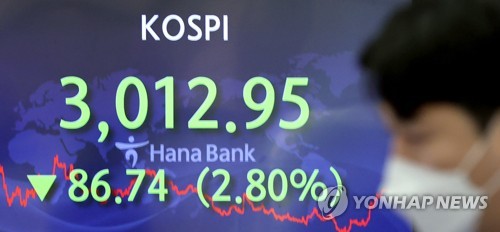Will it affect the rising bond rate’debt investment’… “Still Limited”
Interest rates below one year affected by credit loans are stable
From the second half of the year, loan interest rates will also be affected. “Possibility of amplifying fear when adjusting”

(Seoul = Yonhap News) Reporter Ji-Heon Lee = It attracts attention whether the rise in global bond rates will lead to an increase in the interest burden on credit loans, which will also affect the’debt investment’ in the domestic stock market.
Experts are not at the stage of worrying about the increase in the interest burden of investors who have bought stocks in debt, but are concerned that it will be a factor that will increase the burden on the stock market in the future.
According to the financial investment industry on the 1st, the 5-year Treasury Bond yield on the 26th of last month ended at 1.449% per annum and rose to the highest level in 11 months since March 23rd last year (1.42% per annum). The daily rise also reached 7.5bp (1bp = 0.01% point).
The 3-year Treasury Bond interest rate also rose to 1.024% annually during the morning of the same day, showing the highest level in eight months.
It can be interpreted that as the rise in bond yields has steepened, it has begun to gradually affect not only long-term interest rates, but also mid- and short-term bonds under 5 years.
In anticipation that the economic recovery and inflation rebound could be earlier than expected, global bond yields recently showed a sharp rise, mainly for long-term bonds for more than 10 years.
It is generally recognized that if the market interest rate rises, the loan interest rate linked to it also rises, which adversely affects the stock market. This is because it increases the interest burden of investors who bought stocks in debt.
However, the general view of the financial sector is that the rise in mid- to mid-term interest rates is not yet to have a direct impact on debt investment.
Most financial companies use short-term bonds with maturities of 3 months to 1 year, which are shorter than 3-year bonds, when calculating the interest rate on credit loans, because these rates have been stable until recently.
However, experts point out that from the second half of this year, it is expected that the interest rate on credit loans will gradually rise, so it is necessary to be wary of the possibility of increasing the burden on the stock market.
Lee Mi-seon, a researcher at Hana Financial Investment, said, “Now, the interest rate rises mainly to long-term interest rates, but in the second half of this year, the rate of rise is expected to shift to 5-year and 3-year bonds.” It will have an impact,” he predicted.
Samsung Securities researcher Jung Myung-ji pointed out, “If the loan rate rises, the increase in the interest cost burden on investors is also a problem, but there is a possibility that it will lead to a vicious cycle of expanding and reproducing the fear of the stock market when it is aligned with the adjustment phase of growth stocks.”
However, he added, “If it is at the level of the current interest rate and the stock price, it will not be a big issue yet.”
Monetary policy authorities are also taking a careful look at the impact of rising loan rates on the asset market.
Bank of Korea Governor Lee Ju-yeol said at a press conference on the 25th of last month, “If the market interest rate rises sharply, it will lead to an increase in the loan interest rate no matter which route it takes, leading to an increase in the debt burden, and the volatility of the asset market such as stocks. There is,” he said, “of course, we are checking such a situation.”
[email protected]
(End)
<저작권자(c) 연합뉴스, 무단 전재-재배포 금지>
